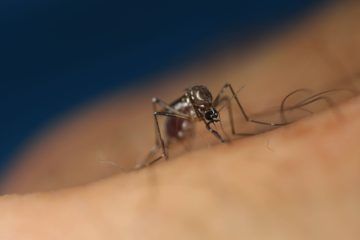Freda Kreier in Nature:
 The viruses that cause the tropical diseases Zika and dengue fever can hijack the body odour of their hosts to their advantage, a study shows1. Both viruses alter how mice smell to make the animals more appetizing to hungry mosquitoes. This tactic could help the viruses to catch a ride to fresh targets, says co-author Gong Cheng, a microbiologist at Tsinghua University in Beijing. Techniques for interrupting this smelly takeover could help to control not only Zika and dengue, but also other mosquito-borne diseases, he says. The research was published on 30 June in Cell.
The viruses that cause the tropical diseases Zika and dengue fever can hijack the body odour of their hosts to their advantage, a study shows1. Both viruses alter how mice smell to make the animals more appetizing to hungry mosquitoes. This tactic could help the viruses to catch a ride to fresh targets, says co-author Gong Cheng, a microbiologist at Tsinghua University in Beijing. Techniques for interrupting this smelly takeover could help to control not only Zika and dengue, but also other mosquito-borne diseases, he says. The research was published on 30 June in Cell.
Researchers have known for decades that some diseases can change how their hosts smell, says James Logan, a disease-control specialist at the London School of Hygiene & Tropical Medicine. Certain viruses and microorganisms have evolved to use this to their advantage. For instance, plants that are infected with the Cucumber mosaic virus release a molecule that attracts aphids, which the virus uses as a vector to infect new plants2. Scientists have also found that parasites that cause malaria advertise their hosts to passing mosquitoes through changes in body odour3.
To see whether the Zika and dengue viruses had also evolved ways to attract mosquitoes’ attention, Cheng and his colleagues infected mice with one or the other. They then placed infected and healthy mice in separate enclosures and wafted their scent into a mosquito-filled chamber that was connected to both enclosures, to see which group the insects preferred. Around 65–70% of the mosquitoes moved towards the enclosure with infected mice, suggesting that these animals smelled more appealing.
More here.
